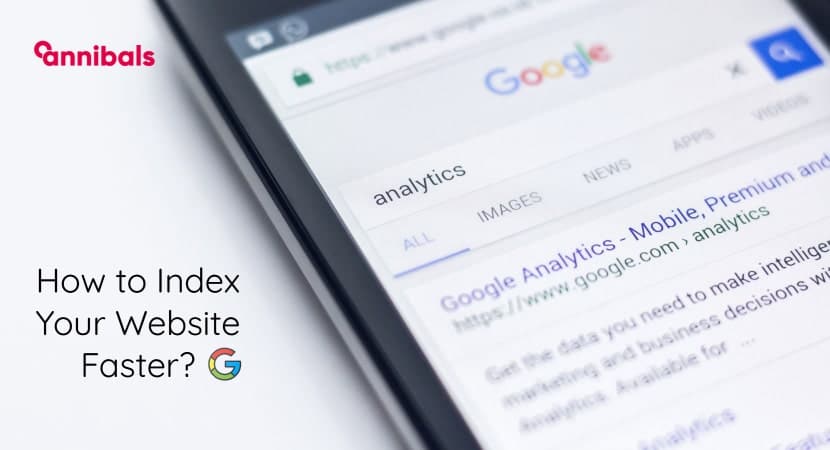For your site’s contents to be included in your custom search engine, they must be included in the Google index. The Google index is similar to a library index which lists information on all the books. However, the Google index lists all the web pages that Google knows about instead of books. Your site needs to be indexed, as it may help to increase visibility. The average user does not go past the first page of Google.
Sharing your page on social media platforms and websites with higher traffic may act as a medium to boost your indexing. There is also an option to use the Google Search Console to request if you want more pages included in the Google index.
Firstly we will see why we should index a website and how to do it.
How to Index a Website on Google? And Why?
To understand indexing, we need to under the term crawling. Google has virtual spiders, which in layman’s terms basically crawl over the internet, covering various web pages and storing their data. Crawling means following your links and “crawling” around your website.
When bots come to your website (any page), they follow other linked pages also on your website. They do so to form a database. Then that database is accessed at the time of searches, and appropriate results are displayed.

After the page has been discovered, then Google basically attempts to understand what the page is about. It does through the comparisons using the data which is already present in the database. This process is called indexing. It takes in the number of images, videos and also catalogs the website according to another type of data present on the website. This entire information is then stored in the Google Index. This database is not your average three tables database, but a database spanning over many, many computers. This is an integral part of indexing.
Other than this, another concept to understand is, ranking. When a user types a query, Google tries to find the most relevant answer from its index based on many factors. Google tries to determine the highest quality answers, and factor in other considerations that will provide the best user experience and most appropriate answer, by considering things such as the user’s location, language, and device (desktop or phone).
For example, searching for “market places near me” would show different answers to a user in New York than it would to a user in Sydney. Google doesn’t accept payment to rank pages higher, and ranking is done programmatically. To improve your serving and ranking:
- Make your page fast to load, and mobile-friendly.
- Put useful content on your page and keep it up to date.
In the world of Search Engine Optimization (SEO), this indexing is the make it or break it factor. Many digital marketers, promoters spend hours understanding how this works, so that their content is always on the top. This practice came into the picture of the internet boom, and Google had to think of innovative and efficient ways to deliver the right searchers at the right time.
See Also: SumUp V/s Square: Pick The Right One For Your Business.
Indexing on Your Tips
According to Google’s official website, they give us three simple tips to improve indexing. However, the picture is much larger than that. Researchers have extensively studied the art of SEO, and today, we will provide you with the best tips out of the rest. Let’s start slow.
Tip #1: Creating Short and Meaningful Page Titles
The notion of less is more is the path to follow here. Page titles spanning more than 8 words with complex titles are going to get your rank down. Also, avoid using unnecessary short forms, pop culture references that most people won’t understand, and put a hold on that Thesaurus.
Tip #2: Using Text Rather than Images to Get Your Content Across
Surprised? Well, contrary to the notion that the images portray more than the text does, which is actually true of a human’s understanding, Google doesn’t work quite the same. Images, and videos may add the necessary flare to your project and also be more attractive.
However, the reality is that Google can understand some images and videos, but not as well as it can understand the text. So using a large number of videos and photographs becomes a risky affair. At the minimum, you can annotate your video and images with alternative text and other attributes as appropriate.
Tip #3: Share your page on Social Media Extensively
It’s no surprise that social media today is the governing body for the internet. Google often crawls Twitter, Facebook, and other social media platforms. It’s an absolute must that you share the link of your website repeatedly on your selected platform. Not only does it improve your content, but it also gives your followers a direct link into your business and otherwise.
Tip #4: Share your page on websites with Higher Traffic
Few websites like Reddit and Quora have a much higher access number than other websites. The questions and blogs all act as another medium to boost your indexing. Search for content-appropriate posts and keep putting up your link wherever you can. It can work like a charm.
We’ve covered the noob material. Now it’s time for the real deal.
Tip #5: Using Fetch as Google
Google Search Console is a hidden feature that many of us fail to look at and understand when taking the SEO stage into accounting. If you’re using the old Google Search Console, you’re missing out on a hell of a lot of traffic.
The new Google Search Console is providing a feature that allows you to submit a site to google easily. It lets you input a URL for Google to “Fetch.” After submission, a Googlebot will visit your page and index. These are the simple steps to follow:
- Log into the Google Search Console
- Navigate to the Crawl Fetch tab as Google
- Take the URL you would like to be indexed and paste it into the search bar
- Click on the Fetch button
- After Google has found the URL, click on Submit to Index
- Assuming that the page is indexable, it will be picked up within a few hours.
Tip #6: Block low-quality pages from Google’s Index
All of us have heard the term, ‘Content is king, ‘and bad content might just be your enemy. Too many low-quality pages can decrease the number of times Google crawls, indexes, and ranks your site.
For that reason, you want ever so often to update it and try and remove the various garbage content your site might contain. These increase the size of your website, might not serve any purpose, and end up lowering your index as well.
Pages that serve no value should be:
- Set to NOINDEX.: The page might still have value to your audience, but not to the search engines (consider pages like thank you pages, paid to land pages, etc.).
- Blocked via crawl through Robots.txt file: While an entire set of pages has value to your audience, but not to the search engines (consider pages like archives and press releases).
- 301 redirected: These are those pages that have no value to your audience or search engines, but still have existing traffic or links (Consider pages like old blog posts with links).
- Deleted (404): These include pages that have no value to your audience or search engines, and actually have no existing traffic or links.
Tip #7: Use an effective Sitemap
Your sitemap is a guide to help search engines understand which pages on your site are important. When you submit a site to Google, you should also submit a sitemap in Google Webmasters. Having a page in your sitemap does NOT guarantee indexation, but failing to include important pages will decrease the chances.
FAQs
What does it mean when Google index your website?
The Google index is like a library's catalogue, which lists all the books the library has available.The Google index, however, contains all of the websites that Google is aware of rather than books. Google recognises new and updated pages on your website and updates the Google index when it visits.
Is Google indexing free?
You may use Google Search Console, a free service, to keep track of how frequently Google indexes and lists your website in its search results.
How do I find the index of a website?
Using the'site:' operator with a Google search to see if your page is indexed is the quickest and easiest method. However, manually checking every page's indexation would take a very long time.
Index a Website on Google – Summary
We believe that now you can submit your site to google without any issue. The article pretty much concludes the various tips that actually work! Other than this, many digital marketers often persuade the user to understand the whole sphere of SEO. Try taking free online courses to get into the depth of SEO or you can keep checking our blog.
We also recommend that before actually taking indexing, and ranking into consideration, focus on your content. After all, all the Internet’s content, ranking, and indexing are merely players. Now, if you have good content writing and marketing requirements, you can also try our content writing services.

